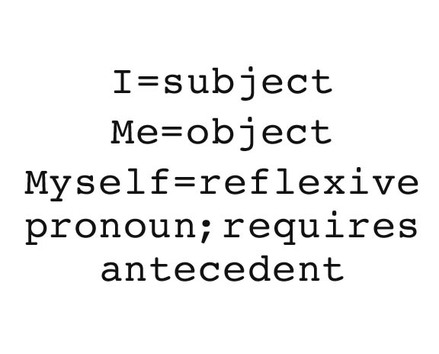But if you ask Ann and I what we'd give, to break up just one more fight between the boys...
Sorry, Mitt. That should be "Ann and me."
I and me are personal pronouns. We use the personal pronoun I (a subject pronoun) when referring to a subject (the doer of action); use me (an object pronoun) when referring to the object of an action. In the example from Mitt's speech, the "I" in the sentence is being asked a question; it is the object of the action.
Most speakers and writers understand the basics of personal pronouns. It's when we're faced with a compound subject (like Mitt's) that some of us choke and use the wrong pronoun. For example, most of us know it's correct to say "I went to the concert last night" instead of "Me went to the concert last night." And "John gave the concert tickets to me" would be an easy choice over "John gave the concert tickets to I." Still, some folks would easily (and incorrectly) say: "John gave the concert tickets to Jim and I."
An easy way to determine if you're using the correct pronoun is to break down the compound subject in a sentence and make it into two complete sentences with a single subject:
John gave the concert tickets to Jim.
John gave the concert tickets to me.
John gave the concert tickets to Jim and me.
If me is correct by itself, then it's the right choice when you're using it with with another noun.
Another common mistake is the misuse of the reflexive pronoun myself. For example:
Read the report and send your feedback to Tom and myself. (wrong)
Read the report and send your feedback to Tom and me. (correct)
As a reflexive pronoun, myself must be preceded by a noun, pronoun, adjective or adverb that it refers back to (its antecedent). In the example above, myself has no antecedent. Examples of correct usage include:
I saw myself in the mirror.
I treated myself to a cup of hot tea.
In these examples, myself refers back to its antecedent: I. Himself, herself and yourself are also reflexive pronouns. You could easily substitute he/himself or her/herself into the second sentence above. (She treated herself to a cup of hot tea.)
That's it for me, myself and I. I hope this post helped you sort out any issues you might have in using them.
Have you been tripped up by personal pronouns? Do you notice when writers and speakers misuse the pronouns cited in this post? Please share your thoughts in the Comments.


